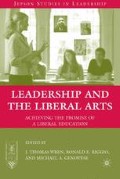Abstract
In a volume about integrating leadership into the liberal arts, this chapter thinks otherwise. It agrees with the other contributions to this volume that an education in the liberal arts is critical for meeting the leadership challenges of today’s world. However, it diverges from the mainstream in two respects: first, it portrays education in the liberal arts less as an academic venture and more akin to the development of the ability to respond to opportunities in a creative and moral manner; second, it asserts that, contrary to preconceptions and stereotypes, studying management, as a discipline of thinking and action, is central to realizing the ancient promise of leadership, which is the liberal arts as a practical wisdom aimed at doing good things in the world.
They characterize men who ignore our practical needs and delight in mental juggling of the ancient sophists as “students in philosophy” but refuse this name to those who pursue and practice those studies which will enable us to govern wisely both our households and the commonwealth—which should be the objects of our toil, of our study, or our every act.1
—Isocrates 400 BC Athens
Discriminate, Illuminate; use abundantly all things available.2
—Confucius 400 BC China
Access this chapter
Tax calculation will be finalised at checkout
Purchases are for personal use only
Preview
Unable to display preview. Download preview PDF.
Notes
Isocrates, Antidosis in The Rhetorical Tradition: Readings from the Classical Times to the Present, ed. Patricia Bizzell and Bruce Herzberg (Boston: St. Martin’s Press, 1990), p. 53.
Confucius, The Great Digest, The Unwobbling Pivot, The Analects, trans. Ezra Pound (Norfolk, CT: New Directions, 1951), p. 159.
Sterling Lamprecht, ed. The Early Philosophers of Greece (New York: D. Appleton-Century, 1935), p. 120.
Benjamin Graham, The Memoirs of the Dean of Wall Street (New York: McGraw Hill, 1996), p. 141.
Peter Drucker, The Essential Drucker (New York: HarperBusiness, 2001), p. 72.
Roger A. Mason, Kingship and the Commonweal (East Linton, Scotland: Tuckwell Press, 1998), p. 107.
I. A. Richards, Interpretation in Teaching (New York: Humanities Press, 1971), p. 3.
Marshall McLuhan, “The Medieval Environment: Yesterday or Today” in Listening, 9, nos. 1 and 2 (Winter/Spring, 1974): 9–27.
Peter Drucker, Landmarks of Tomorrow (New York: Harpers Brothers, 1959), p. 157.
Josef Pieper, The Four Cardinal Virtues (Indiana: Notre Dame Press, 1968), p. 6.
Peter Drucker, The Essential Drucker (New York: HarperBusiness, 1999), pp. 10–11.
Marshall McLuhan, Take Today: The Executive as Dropout (New York: Harcourt, 1972), p. 7.
Edgar Allen Poe, “A Descent into the Maelstrom,” in Complete Stories and Poems of Edgar Allen Poe (New York: Doubleday, 1984), pp. 108–120.
Marshall McLuhan, Understanding Media: The Extensions of Man (Corte Madera, CA: Ginko Press, 2003), p. 95.
See Josef Pieper, Living the Truth (San Francisco: Ignatius Press, 1989).
Gerald Phelan, Saint Thomas and Analogy (Milwaukee: Marquette University Press, 1941), p. 5.
Ezra Pound, ABC of Reading (New York: New Directions, 1960).
Editor information
Copyright information
© 2009 J. Thomas Wren, Ronald E. Riggio, and Michael A. Genovese
About this chapter
Cite this chapter
Maroosis, J. (2009). Leadership Is the Practice of the Liberal Arts. In: Wren, J.T., Riggio, R.E., Genovese, M.A. (eds) Leadership and the Liberal Arts. Jepson Studies in Leadership. Palgrave Macmillan, New York. https://doi.org/10.1057/9780230620148_12
Download citation
DOI: https://doi.org/10.1057/9780230620148_12
Publisher Name: Palgrave Macmillan, New York
Print ISBN: 978-1-349-37707-7
Online ISBN: 978-0-230-62014-8
eBook Packages: Palgrave Economics & Finance CollectionEconomics and Finance (R0)

